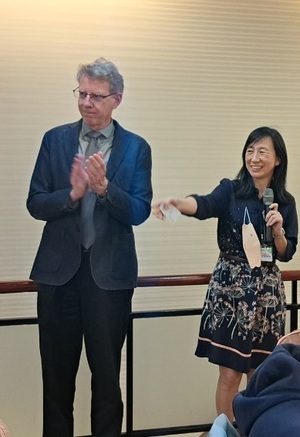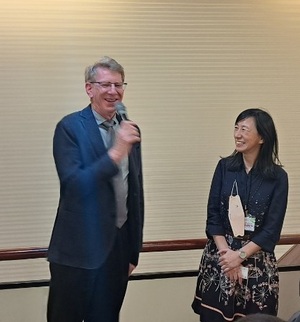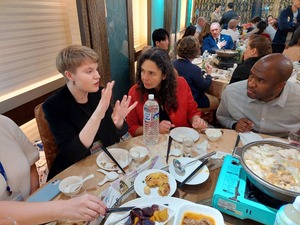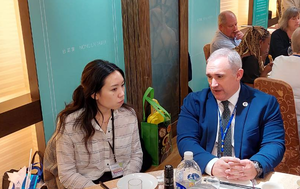God Uses VPN: IMAS Students, Fulbright Dinner, and the Origins of Taiwanese Banquet Cuisine






Date :
2023-03-10
Department :
International Master's Program in International Communication Studies
【Article by College of Social Sciences】
On March 9th, the Dean of NCCU College of Social Sciences, Professor Wan-Ying Yang, hosted a Taiwanese banquet and NCCU Associate Vice President for International Cooperation, Associate Professor Jhih-Syuan Lin, Executive Director Dr. Randall Nadeau of the Foundation for Scholarly Exchange (Fulbright Taiwan) as well as other Fulbright representatives were invited. The representatives consisted of twenty-five Fulbright International Education administrators from a variety of backgrounds. Each administrator is in charge of international affairs from different universities and colleges across the United States. Four American students from the International Master’s Program in Asia-Pacific Studies (IMAS), Fulbright scholarship recipients Josiah Spain, Juliet Paulson, and Tiffany Wong, as well as Faith Woods, a Taiwan MOE scholarship grantee, were also invited to help receive the distinguished guests.
The IMAS students not only shared their experiences in Taiwan with the American visitors, but also explained the unique origin of some of the Taiwanese banquet dishes. Juliet Paulson revealed that the cuisine includes cultural elements and local Taiwanese ingredients from different eras. Paulson explained how lifestyles once reserved for the glitterati have become so popular that they are now accessible to the masses. During Japanese colonization, sashimi, a now more commonplace food, also used to be a delicacy reserved only for the upper class. The Wang Steak, Paulson continued, symbolizes the alliance between the United States and Taiwan from 1955 to 1979. During this period, hearty cuts of beef enjoyed by American soldiers were a sign of luxury. The steak inventor, who used to cook for the richest Taiwanese families, named the dish after himself and transformed the steak into a more widely accessible dish.
Tiffany Wong recalled how she grew up enjoying dishes like jellyfish salad, crispy egg noodles with seafood, and roast duck at Chinese-style banquets for weddings and celebrating major milestones. She remarked how the Taiwanese banquet had its own specialty dishes using local ingredients, like the corn-fed chicken from Taitung, steamed rice cake with Sakura shrimps and scallops, and pickled green mango (also known as Valentine fruit). Although the food was different, the atmosphere of the family-style banquet was still just as lively as she remembered from her childhood.
Josiah Spain discussed honeydew ham, a dish invented by Taiwan-based Chef Peng Chang-kuei. The Chef, who was from Hunan province in China, was the personal chef of Chiang Kai-shek and catered the banquet for visiting US Admiral Arthur W. Radford (1896-1973) in 1952. Due to the banquet guests all having the rank of general at the time, Chef Peng Chang-kuei named a new chicken recipe after Hunan’s General Tso Tsung-tang (1812-1885). Eventually, Peng migrated to New York in 1973 and his famous dish, General Tso’s Chicken, was adapted to fit American tastes. The dish still remains very popular in Chinese takeout culture around the States today.
Another interesting dish served at the banquet was the Abalone with Fish Maw and Steamed Assorted Meat in Jar. Faith Woods noted that this dish was invented in Fujian during the Qing Dynasty. Woods further went on to explain that because of its delicious aroma, its Chinese name is “Buddha Jumps Over the Wall” (佛跳牆). The name jokingly means that the dish is so tempting, even Buddha, a notorious vegetarian, would jump over a wall to taste it! Currently, due to China’s internet restrictions, Chinese netizens use VPN (Virtual Private Network) to “jump” over the government’s firewall to access banned Western websites. Therefore, in China, this dish is sometimes vividly translated as “God (Buddha) Uses VPN.”
By sharing their understanding of Taiwanese cuisine with NCCU’s Fulbright guests, the four IMAS graduate students demonstrated their graduate-level training in history, politics, and culture. Dr. Nadeau and the Fulbright International Exchange administrators all praised the students and their experiences thus far in Taiwan. Dean Wan-Ying Yang and Associate Vice President for International Cooperation, Jhih-Syuan Lin both promised to continue to offer high-quality education and welcome American students to join NCCU’s English-taught international degree programs.
On March 9th, the Dean of NCCU College of Social Sciences, Professor Wan-Ying Yang, hosted a Taiwanese banquet and NCCU Associate Vice President for International Cooperation, Associate Professor Jhih-Syuan Lin, Executive Director Dr. Randall Nadeau of the Foundation for Scholarly Exchange (Fulbright Taiwan) as well as other Fulbright representatives were invited. The representatives consisted of twenty-five Fulbright International Education administrators from a variety of backgrounds. Each administrator is in charge of international affairs from different universities and colleges across the United States. Four American students from the International Master’s Program in Asia-Pacific Studies (IMAS), Fulbright scholarship recipients Josiah Spain, Juliet Paulson, and Tiffany Wong, as well as Faith Woods, a Taiwan MOE scholarship grantee, were also invited to help receive the distinguished guests.
The IMAS students not only shared their experiences in Taiwan with the American visitors, but also explained the unique origin of some of the Taiwanese banquet dishes. Juliet Paulson revealed that the cuisine includes cultural elements and local Taiwanese ingredients from different eras. Paulson explained how lifestyles once reserved for the glitterati have become so popular that they are now accessible to the masses. During Japanese colonization, sashimi, a now more commonplace food, also used to be a delicacy reserved only for the upper class. The Wang Steak, Paulson continued, symbolizes the alliance between the United States and Taiwan from 1955 to 1979. During this period, hearty cuts of beef enjoyed by American soldiers were a sign of luxury. The steak inventor, who used to cook for the richest Taiwanese families, named the dish after himself and transformed the steak into a more widely accessible dish.
Tiffany Wong recalled how she grew up enjoying dishes like jellyfish salad, crispy egg noodles with seafood, and roast duck at Chinese-style banquets for weddings and celebrating major milestones. She remarked how the Taiwanese banquet had its own specialty dishes using local ingredients, like the corn-fed chicken from Taitung, steamed rice cake with Sakura shrimps and scallops, and pickled green mango (also known as Valentine fruit). Although the food was different, the atmosphere of the family-style banquet was still just as lively as she remembered from her childhood.
Josiah Spain discussed honeydew ham, a dish invented by Taiwan-based Chef Peng Chang-kuei. The Chef, who was from Hunan province in China, was the personal chef of Chiang Kai-shek and catered the banquet for visiting US Admiral Arthur W. Radford (1896-1973) in 1952. Due to the banquet guests all having the rank of general at the time, Chef Peng Chang-kuei named a new chicken recipe after Hunan’s General Tso Tsung-tang (1812-1885). Eventually, Peng migrated to New York in 1973 and his famous dish, General Tso’s Chicken, was adapted to fit American tastes. The dish still remains very popular in Chinese takeout culture around the States today.
Another interesting dish served at the banquet was the Abalone with Fish Maw and Steamed Assorted Meat in Jar. Faith Woods noted that this dish was invented in Fujian during the Qing Dynasty. Woods further went on to explain that because of its delicious aroma, its Chinese name is “Buddha Jumps Over the Wall” (佛跳牆). The name jokingly means that the dish is so tempting, even Buddha, a notorious vegetarian, would jump over a wall to taste it! Currently, due to China’s internet restrictions, Chinese netizens use VPN (Virtual Private Network) to “jump” over the government’s firewall to access banned Western websites. Therefore, in China, this dish is sometimes vividly translated as “God (Buddha) Uses VPN.”
By sharing their understanding of Taiwanese cuisine with NCCU’s Fulbright guests, the four IMAS graduate students demonstrated their graduate-level training in history, politics, and culture. Dr. Nadeau and the Fulbright International Exchange administrators all praised the students and their experiences thus far in Taiwan. Dean Wan-Ying Yang and Associate Vice President for International Cooperation, Jhih-Syuan Lin both promised to continue to offer high-quality education and welcome American students to join NCCU’s English-taught international degree programs.


 Fax:886-2-29379611
Fax:886-2-29379611